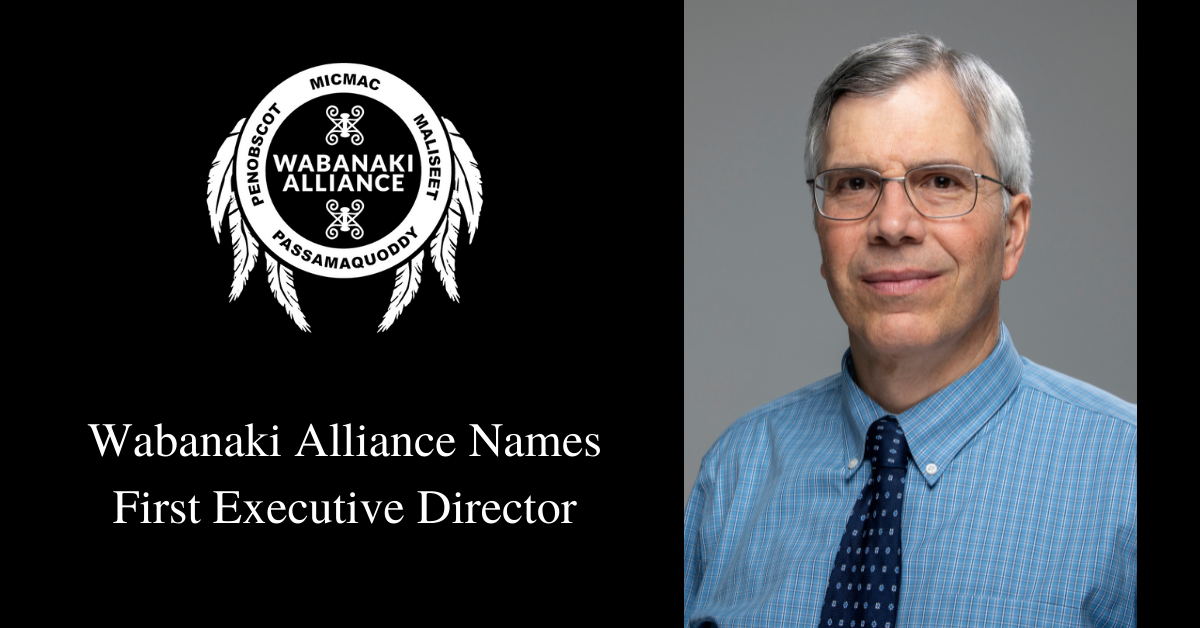The Wabanaki Alliance has hired John Dieffenbacher-Krall, a veteran community organizer and longtime advocate for the Wabanaki tribes in Maine, as its first executive director.
Established in July 2020, the Wabanaki Alliance comprises the four tribes in Maine — Aroostook Band of Micmacs, Houlton Band of Maliseet Indians, Passamaquoddy Tribe, and Penobscot Nation. It was created to educate people about the need for securing the sovereignty of the tribes in Maine
“Being hired as the executive director for the Wabanaki Alliance is an honor,” said Dieffenbacher-Krall. “Much of my professional career has been focused on furthering the understanding of the tribes in Maine. Advocating for their right of political self-determination and educating people about the tribes’ lack of legally-recognized sovereignty, compared to the other 570 federally recognized tribes across the country in 49 other states, is vitally important to the prosperity of the tribes and rural Maine as a whole.”
Dieffenbacher-Krall’s appointment comes at a crucial time for the Wabanaki tribes, who are working with a strong coalition of over 90 organizations and businesses across the state to achieve passage of LD 1626. A bill to protect Wabanaki rights by restoring tribal self-government to tribes in Maine, LD 1626 is sponsored by Rep. Rachel Talbot Ross, D-Portland, assistant majority leader in the 130th Legislature.
“With the 130th Legislature’s second legislative session beginning, it’s ideal timing to have John at the helm of the Wabanaki Alliance. As we advocate for LD 1626 at the legislature, John will be an integral part in the success of the passage of the legislation,” said Rena Newell, Passamaquoddy representative to the Maine House of Representatives and secretary of Wabanaki Alliance.
Dieffenbacher-Krall most recently worked as the assistant director of research in the College of Natural Sciences, Forestry, and Agriculture at the University of Maine. Prior to that role he held the executive director position for the Maine Indian Tribal-State Commission for 12 ½ years.
His tribal-related volunteer service includes:
- Agenda Committee for the Maine Coalition for Tribal Sovereignty
- Planning Committee for the Race and Sovereignty Initiative
- Diocesan Representative to the United Nations Permanent Forum on Indigenous Issues 11th Session
- Episcopal Church Province I Indigenous Justice Network
When Dieffenbacher-Krall concluded his service as MITSC executive director, the Right Rev. Stephen Lane appointed him chair of the Episcopal Diocese of Maine Committee on Indian Relations, a position he held until March 15, 2021. Dieffenbacher-Krall also has served on several boards and steering committees, including the Social Justice Center in Albany, N.Y.; Maine People’s Resource Center; MaineShare; Northeast Action; and US Action.
A ‘tenacious worker and advocate’
Tribal leaders voiced strong appreciation of Dieffenbacher-Krall’s credentials and his longstanding work in support of the Wabanaki tribes in Maine.
“John has been an ally of the tribes for decades,” said Maulian Dana, board president of the Wabanaki Alliance and ambassador for the Penobscot Nation. “He has always been a strong advocate for the tribes in Maine. His commitment to fairness and justice for the tribes in Maine has been unparalleled for decades.”
“We are extremely grateful and appreciative of John’s knowledge and commitment to the tribes in Maine,” added Richard Silliboy, vice chief of the Aroostook Band of Micmacs and vice-president of the Wabanaki Alliance. “More importantly, he is an effective leader with a wealth of experience leading organizations.”
Prior to assuming leadership of MITSC, Dieffenbacher-Krall worked as the executive director for the Maine People’s Resource Center. He simultaneously served during that time as associate director, co-director, and executive director of the Maine People’s Alliance.
Before moving to Maine Dieffenbacher-Krall worked as the legislative director and associate director for the Environmental Planning Lobby based in Albany, N.Y. He took a leave during his stint with that organization to lead an educational campaign in support of the 1986 New York State Environmental Quality Bond Act. The $1.45 billion measure created a N.Y. State Superfund Program and preserved land and historic buildings. It passed with more than 67% of the vote.
He began his professional career as a canvasser for the New Jersey Public Interest Research Group.
“John is a tenacious worker and advocate for educating people about the tribes in Maine,” said Darrell Newell, vice chief of the Passamaquoddy Tribe at Indian Township and treasurer of the Wabanaki Alliance. “As an educator, advocate, and organizer, he’s constantly fought for justice for the tribes in Maine.”
“We are so pleased to have John’s wealth of knowledge on our issues and our culture to lead the Wabanaki Alliance,” added Clarissa Sabattis, chief of the Houlton Band of Maliseet Indians and a board member of Wabanaki Alliance. “John understands the importance of fighting for fairness and justice for the tribes in Maine.”
Since the Wabanaki Alliance has been formed, members of the board have presented as guest speakers for numerous organizations educating people on the culture and history of the tribes in Maine. Over 90 organizations and businesses across the state have endorsed LD 1626.





